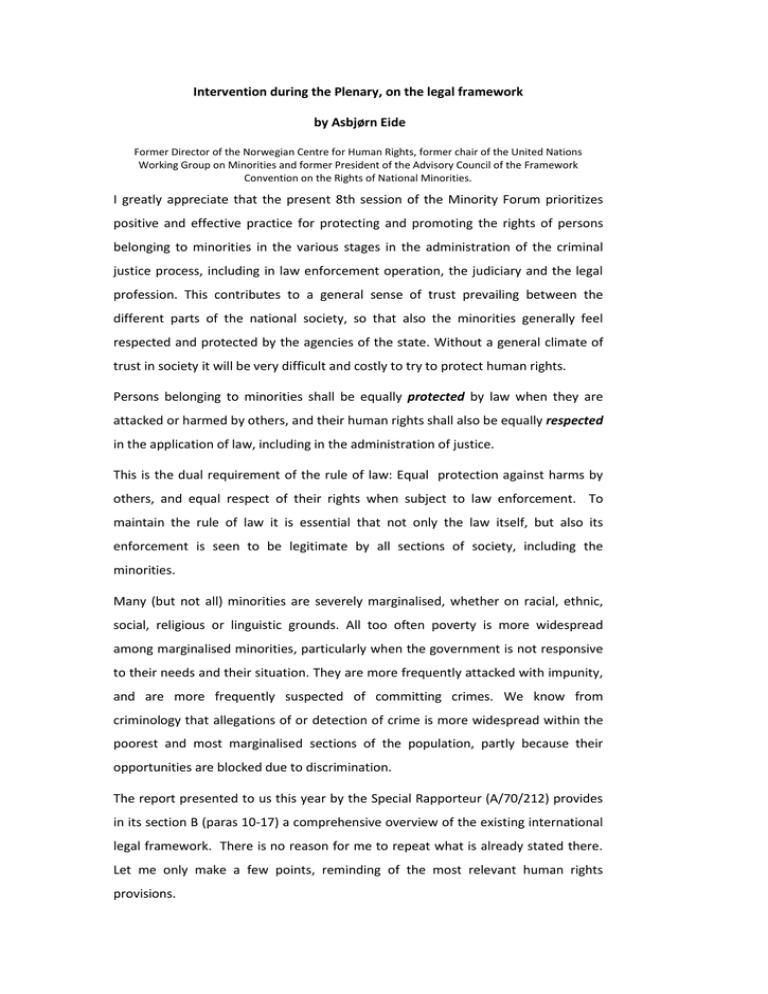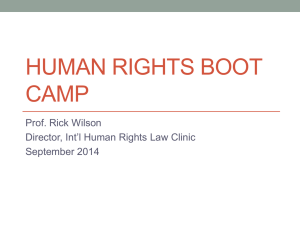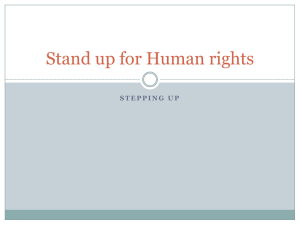Intervention during the Plenary, on the legal framework by Asbjørn Eide
advertisement

Intervention during the Plenary, on the legal framework by Asbjørn Eide Former Director of the Norwegian Centre for Human Rights, former chair of the United Nations Working Group on Minorities and former President of the Advisory Council of the Framework Convention on the Rights of National Minorities. I greatly appreciate that the present 8th session of the Minority Forum prioritizes positive and effective practice for protecting and promoting the rights of persons belonging to minorities in the various stages in the administration of the criminal justice process, including in law enforcement operation, the judiciary and the legal profession. This contributes to a general sense of trust prevailing between the different parts of the national society, so that also the minorities generally feel respected and protected by the agencies of the state. Without a general climate of trust in society it will be very difficult and costly to try to protect human rights. Persons belonging to minorities shall be equally protected by law when they are attacked or harmed by others, and their human rights shall also be equally respected in the application of law, including in the administration of justice. This is the dual requirement of the rule of law: Equal protection against harms by others, and equal respect of their rights when subject to law enforcement. To maintain the rule of law it is essential that not only the law itself, but also its enforcement is seen to be legitimate by all sections of society, including the minorities. Many (but not all) minorities are severely marginalised, whether on racial, ethnic, social, religious or linguistic grounds. All too often poverty is more widespread among marginalised minorities, particularly when the government is not responsive to their needs and their situation. They are more frequently attacked with impunity, and are more frequently suspected of committing crimes. We know from criminology that allegations of or detection of crime is more widespread within the poorest and most marginalised sections of the population, partly because their opportunities are blocked due to discrimination. The report presented to us this year by the Special Rapporteur (A/70/212) provides in its section B (paras 10-17) a comprehensive overview of the existing international legal framework. There is no reason for me to repeat what is already stated there. Let me only make a few points, reminding of the most relevant human rights provisions. UDHR Article 1 states that all human beings are born free and equal in dignity and rights. They are endowed with reason and conscience and should act towards one another in a spirit of brotherhood. Article 2 provides that everyone is entitled to all the rights and freedoms set forth in this Declaration, without distinction of any kind, such as race, colour, sex, language, religion, political or other opinion, national or social origin, property, birth or other status. Under UDHR Article 3, everyone has the right to life, liberty and security of person. We could further refer to the prohibition of torture and cruel, inhuman or degrading treatment (UDHR article 5), the principle that all are equal before the law and are entitled without any discrimination to equal protection of the law (UDHR article 7, first sentence; that all are entitled to equal protection against any discrimination in violation of the Declaration and against any incitement to such discrimination.(UDHR article 7, second sentence), that everyone has the right to an effective remedy by the competent national tribunals for acts violating the fundamental rights granted him by the constitution or by law. (UDHR article 8), that no one shall be subjected to arbitrary arrest, detention or exile.(UDHR article 9). That everyone is entitled in full equality to a fair and public hearing by an independent and impartial tribunal, in the determination of his rights and obligations and of any criminal charge against him, UDHR article 10). That everyone charged with a penal offence has the right to be presumed innocent until proved guilty according to law in a public trial at which he has had all the guarantees necessary for his defense (UDHR article 10). The International Covenant on Civil and Political Rights (ICCPR) article 14 is of particular importance. All persons shall be equal before the courts and tribunals. In the determination of any criminal charge against him, or of his rights and obligations in a suit at law, everyone shall be entitled to a fair and public hearing by a competent, independent and impartial tribunal established by law. Everyone charged with a criminal offence shall have the right to be presumed innocent until proved guilty according to law. In the determination of any criminal charge against him, everyone shall be entitled to the following minimum guarantees, in full equality: (a) To be informed promptly and in detail in a language which he understands of the nature and cause of the charge against him; (b) to have adequate time and facilities for the preparation of his defense and to communicate with counsel of his own choosing; (c) To be tried without undue delay; (d) To be tried in his presence, and to defend himself in person or through legal assistance of his own choosing; to be informed, if he does not have legal assistance, of this right; to have legal assistance assigned to him in any case where the interests of justice so require, and without payment by him in any such case if he does not have sufficient means to pay for it; (e) To examine, or have examined, the witnesses against him and to obtain the attendance and examination of witnesses on his behalf under the same conditions as witnesses against him; (f) To have the free assistance of an interpreter if he cannot understand or speak the language used in court; (g) Not to be compelled to testify against himself or to confess guilt. When a person has by a final decision been convicted of a criminal offence and when subsequently his conviction has been reversed or he has been pardoned on the ground that a new or newly discovered fact shows conclusively that there has been a miscarriage of justice, the person who has suffered punishment as a result of such conviction shall be compensated according to law We should also remind ourselves of article 15 (non-retroactivity): That no one shall be held guilty of any criminal offence on account of any act or omission which did not constitute a criminal offence, under national or international law, at the time when it was committed, or a heavier penalty be imposed than the one that was applicable at the time when the criminal offence was committed. Finally, let me briefly remind ourselves of ICCPR article 26: All persons are equal before the law and are entitled without any discrimination to the equal protection of the law. In this respect, the law shall prohibit any discrimination and guarantee to all persons equal and effective protection against discrimination on any ground such as race, colour, sex, language/e, religion, political or other opinion, national or social origin, property, birth or other status. These are legal safeguards that should apply to everyone, but all too often they are not sufficiently respected when the different agencies of criminal justice deals with persons belonging to vulnerable minorities.


